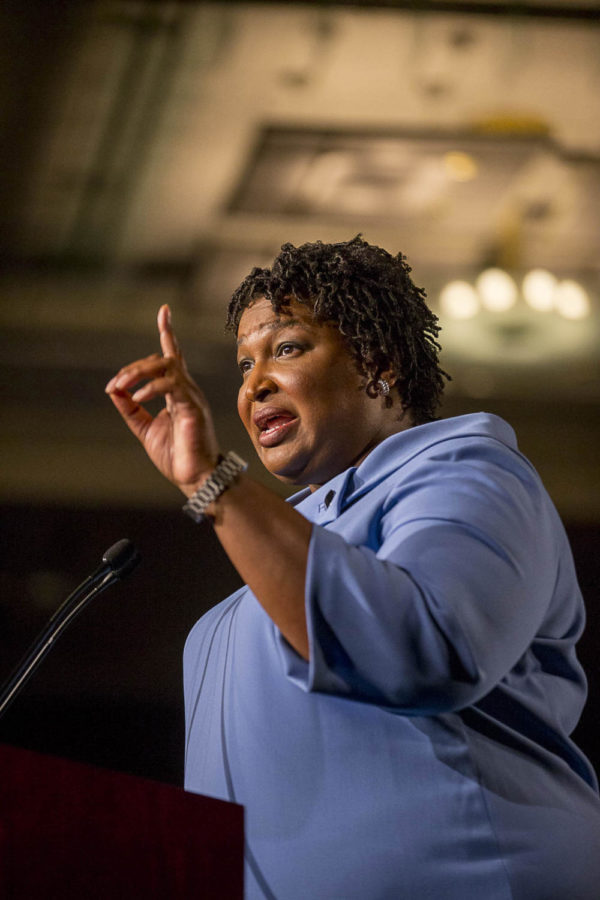‘Incompetence and malfeasance’ led to voter suppression effort, Stacey Abrams says
Alyssa Pointer/Atlanta Journal-Constitution/TNS
Georgia Democrat Stacey Abrams speaks to her supporters during her election night watch party at the Hyatt Regency in Atlanta on November 7, 2018. Abrams told a congressional subcommittee examining ways to boost voting rights that “incompetence and malfeasance” led to a systemic voter suppression effort in Georgia.
February 19, 2019
Former Georgia Democratic gubernatorial candidate Stacey Abrams told a congressional subcommittee examining ways to boost voting rights that a toxic combination of “incompetence and malfeasance” led to a systemic voter suppression effort in Georgia.
“Incompetence and malfeasance operates in tandem and the sheer complexity of the state’s voting apparatus smooths voter suppression into a nearly seamless system that targets voter registration, ballot access and ballot counting,” Abrams told the House Administration’s subcommittee on elections. “These hurdles have had their desired effect.”
Republicans lambasted Tuesday’s hearing, calling it a congressionally funded ad for a potential Abrams 2020 Senate run against incumbent Sen. David Perdue, R-Ga.
“This hearing as well as her State of the Union address (response) are part and parcel of a Democratic desire to see that race,” said John Watson, chairman of the Georgia Republican Party. “This is the next stage of the promotion of Stacey Abrams on the taxpayer’s dime. I believe these are in-kind contributions for her campaign for the United States Senate.”
Rep. Hank Johnson, D-Ga., a subcommittee member, referred to Abrams as “Sen. Abrams” when he began questioning her. Rep. Terri Sewell, D-Ala., another subcommittee member, lauded Abrams’ gubernatorial run, adding, “All I can say is ‘Black Girl Magic.'”
The hearing is the first full session in a series that will stretch across the country.
Georgia became the epicenter of the skirmish between Democrats, who accused Republican gubernatorial candidate Brian Kemp of engaging in voter suppression as secretary of state, and Republicans who said culling the rolls was necessary to guard against voter fraud.
Abrams lost to Kemp by 55,000 votes. She has refused to say that Kemp was legitimately elected.
“While I acknowledge the results of the 2018 election in Georgia, I did not and we cannot accept efforts to undermine our right to vote,” Abrams said in her Democratic response to President Donald Trump’s State of the Union message earlier this month.
Watson said Abrams “still can’t come to grips that she lost an election that was open, fair, transparent and record-breaking.”
In a June 2013 decision, the Supreme Court struck down a provision of the 1965 Voting Rights Act that required some or all of 15 states and jurisdictions with a history of racial discriminations at the polls to get federal approval, pre-clearance, before changing their voting rules.
Texas, Alabama, Alaska, Georgia, Louisiana, South Carolina and Virginia were subject to preclearance along with local jurisdictions in California, Florida, Michigan, New Hampshire, New York, North Carolina and South Dakota.
The court urged Congress to revisit the law. But a Republican-controlled House and Senate took no action to do so, despite the introduction of several bipartisan bills to remedy the preclearance issue.
Restoring the provision is a top agenda item of House Democrats’ larger bill that would also restrict the purging of voter roles, require presidents and vice presidents to release their tax returns, have independent redistricting commissions draw election district boundaries, and make Election Day a federal holiday.
Led by Senate Majority Leader Mitch McConnell of Kentucky, Republicans have branded the Democratic effort as a “power grab.” Watson said Georgia doesn’t need to be under preclearance again. “Georgia 2019 doesn’t need preclearance from the Justice Department,” he said. “This is a state of 10.3 million people who can appropriately, judiciously and transparently run our elections … as exampled last cycle in the last election with a record 4 million people voting.”








